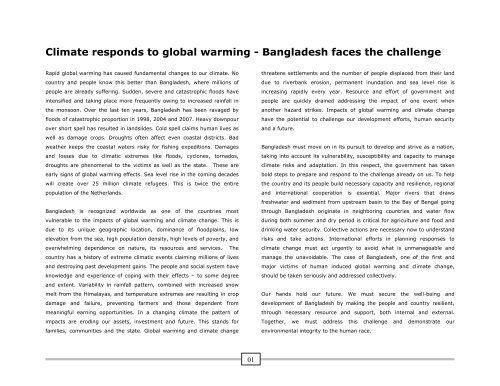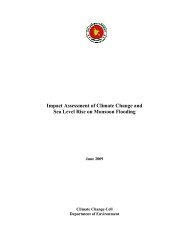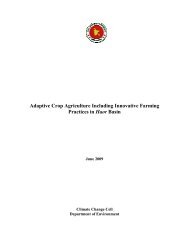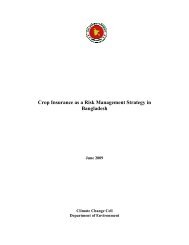CLIMATE CHANGE AND BANGLADESH
CLIMATE CHANGE AND BANGLADESH
CLIMATE CHANGE AND BANGLADESH
You also want an ePaper? Increase the reach of your titles
YUMPU automatically turns print PDFs into web optimized ePapers that Google loves.
Climate responds to global warming - Bangladesh faces the challenge<br />
Rapid global warming has caused fundamental changes to our climate. No<br />
country and people know this better than Bangladesh, where millions of<br />
people are already suffering. Sudden, severe and catastrophic floods have<br />
intensified and taking place more frequently owing to increased rainfall in<br />
the monsoon. Over the last ten years, Bangladesh has been ravaged by<br />
floods of catastrophic proportion in 1998, 2004 and 2007. Heavy downpour<br />
over short spell has resulted in landslides. Cold spell claims human lives as<br />
well as damage crops. Droughts often affect even coastal districts. Bad<br />
weather keeps the coastal waters risky for fishing expeditions. Damages<br />
and losses due to climatic extremes like floods, cyclones, tornados,<br />
droughts are phenomenal to the victims as well as the state. These are<br />
early signs of global warming effects. Sea level rise in the coming decades<br />
will create over 25 million climate refugees. This is twice the entire<br />
population of the Netherlands.<br />
Bangladesh is recognized worldwide as one of the countries most<br />
vulnerable to the impacts of global warming and climate change. This is<br />
due to its unique geographic location, dominance of floodplains, low<br />
elevation from the sea, high population density, high levels of poverty, and<br />
overwhelming dependence on nature, its resources and services. The<br />
country has a history of extreme climatic events claiming millions of lives<br />
and destroying past development gains. The people and social system have<br />
knowledge and experience of coping with their effects – to some degree<br />
and extent. Variability in rainfall pattern, combined with increased snow<br />
melt from the Himalayas, and temperature extremes are resulting in crop<br />
damage and failure, preventing farmers and those dependent from<br />
meaningful earning opportunities. In a changing climate the pattern of<br />
impacts are eroding our assets, investment and future. This stands for<br />
families, communities and the state. Global warming and climate change<br />
threatens settlements and the number of people displaced from their land<br />
due to riverbank erosion, permanent inundation and sea level rise is<br />
increasing rapidly every year. Resource and effort of government and<br />
people are quickly drained addressing the impact of one event when<br />
another hazard strikes. Impacts of global warming and climate change<br />
have the potential to challenge our development efforts, human security<br />
and a future.<br />
Bangladesh must move on in its pursuit to develop and strive as a nation,<br />
taking into account its vulnerability, susceptibility and capacity to manage<br />
climate risks and adaptation. In this respect, the government has taken<br />
bold steps to prepare and respond to the challenge already on us. To help<br />
the country and its people build necessary capacity and resilience, regional<br />
and international cooperation is essential. Major rivers that draws<br />
freshwater and sediment from upstream basin to the Bay of Bengal going<br />
through Bangladesh originate in neighboring countries and water flow<br />
during both summer and dry period is critical for agriculture and food and<br />
drinking water security. Collective actions are necessary now to understand<br />
risks and take actions. International efforts in planning responses to<br />
climate change must act urgently to avoid what is unmanageable and<br />
manage the unavoidable. The case of Bangladesh, one of the first and<br />
major victims of human induced global warming and climate change,<br />
should be taken seriously and addressed collectively.<br />
Our hands hold our future. We must secure the well-being and<br />
development of Bangladesh by making the people and country resilient,<br />
through necessary resource and support, both internal and external.<br />
Together, we must address this challenge and demonstrate our<br />
environmental integrity to the human race.<br />
01





